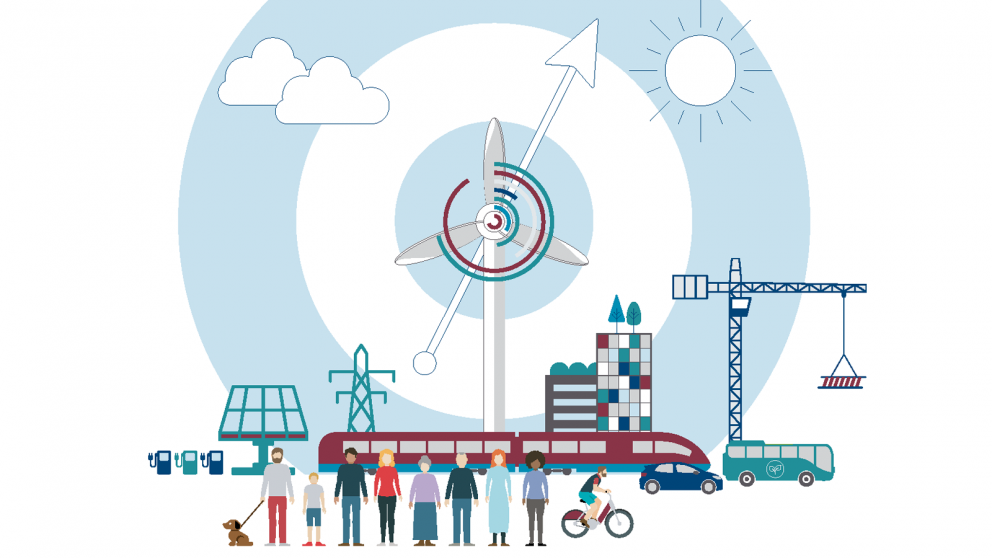Energy Transition Enjoys Broad Support among German Populace – and for Most, is not Proceeding Fast Enough
22.07.2021
What does German public opinion say about the clean-energy transition? According to the findings of a recent representative survey, almost 80 percent of Germans see the decarbonization of the energy and transport sectors as a collective responsibility. More than half think the transformation is not occurring with sufficient speed. In addition, most view the transformation as too expensive.

More than 6,800 people in Germany were recently surveyed regarding the clean-energy transition as part of the Ariadne project, which aims to identify effective decarbonization strategies. The findings of the survey are available online in an interactive format at ariadneprojekt.de.
Enabling evidence-based policy
Public debate in Germany regarding the policy goal of achieving net-zero in the energy and transport sectors has only intensified in the run-up to the 2021 Bundestag elections. The Social Sustainability Barometer is a representative survey of public opinion on the energy transition that has been published annually by the Institute for Advanced Sustainability Studies (IASS) in cooperation with Forsa since 2017. The 2021 survey wave included for the first time questions regarding the transformation of the transport sector toward greater sustainability (referred to in German as the Verkehrswende).
The German public generally recognizes the necessity of the energy transition and is also willing to shoulder burdens to achieve climate goals, the survey finds. For example, 73 percent of survey participants expressed support for the policy goal of reducing household energy consumption. More than one-third would be willing to pay higher taxes for environmentally harmful products. More than one-third view excessive bureaucracy as a major impediment to the energy transition. Furthermore, more than half of those surveyed believed the costs and benefits of energy policy measures are unfairly distributed between households and companies.
“The Sustainability Barometer tracks attitudes and expectations regarding specific climate policy measures, and is much more than a mere snapshot of the public’s mood,” explains Ingo Wolf, a Senior Research Associate at IASS. “As an annually recurring survey, it provides broad insight into current and emerging challenges in various dimensions of people’s lives. In this way, it furnishes an evidence base for policy priorities and decisions.”
Public wants to make an active contribution
In terms of policy instruments, a large majority of the German population is in favor of expanding renewables. Ninety percent of those surveyed, for example, support the further development of rooftop solar systems. In addition, a large share of the population can imagine taking an active role in the energy transition, with expressions of support ranging from an interest in green power to the formation of local cooperatives for investment in renewable systems. Some 47 percent could envision purchasing an electric vehicle. In addition, half of the participants said they would prefer to make more trips by walking or riding a bike. However, the transition to greater sustainability should remain affordable, and there is little support for reduced mobility. For example, about half rejected a general road-usage toll for cars or higher parking fees. And one-quarter said that public transportation would have to be better and cheaper for them to give up shorter trips by car. At the same time, more than half of those surveyed favor the introduction of a speed limit on the autobahn. More than half also support eliminating the tax advantage enjoyed by diesel fuel in relation to gasoline.
Survey participants also expressed concern for the socioeconomic impacts of the energy transition, with nearly half asserting that associated costs are unfairly distributed between different income groups. In the opinion of those surveyed, the disadvantaged should be insulated from excessive burdens and those responsible for pollution should be held more accountable.
“Despite various points of ambivalence and dissatisfaction, the German population affirms the necessity of the energy transition, wants to support necessary policy steps, and is willing to accept burdens in moderation,” says IASS Director Ortwin Renn. “These findings should be viewed by policymakers as encouragement to adopt effective climate policies. Yet the transformation of the energy and transport sectors can only succeed as a collective effort. Accordingly, policymakers need to enable citizens to invest in the process while also maintaining a sense of proper proportion and fairness, e.g. regarding the equitable sharing of burdens.”
In dialog with civil society
The Social Sustainability Barometer is one element of the ongoing dialog with civil society foreseen by the Ariadne project, which is being supported by Germany’s Federal Ministry of Education and Research (BMBF). The dialog process, which was initiated in the fall of 2020 with focus groups on the energy transition, will continue with a range of workshops and conferences. The administered survey was developed based on input received from randomly selected participants regarding climate and energy policy, including in particular their normative perspectives and experiences. The findings of the panel survey will inform further deliberations with citizens regarding policy options for decarbonizing the energy and transport sectors.
Further reading:
- Soziales Nachhaltigkeitsbarometer der Energie- und Verkehrswende 2021
- Soziales Nachhaltigkeitsbarometer 2021 Online
- 2019 Social Sustainability Barometer
- 2018 Social Sustainability Barometer
- 2017 Social Sustainability Barometer

